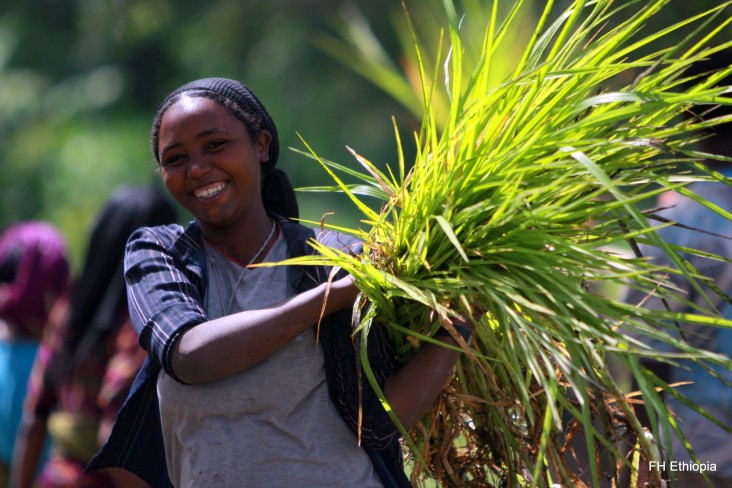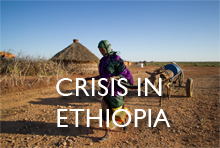Ethiopia
- History
- Our Work
- Foreign Assistance Data
- Dollars to Results
- PARTNERS
- Newsroom
- Fact Sheets
- WORK WITH US

Ethiopia’s economy is dependent on agriculture, which contributes 43 percent of the GDP and 90 percent of exports. However, just five percent of land is irrigated, and crop yields from small farms are below regional averages. Market linkages are weak, and the use of improved seeds, fertilizers and pesticides remains limited. Despite these challenges, agriculture-led economic growth that is linked to improved livelihoods and nutrition can become a long-lasting solution to Ethiopia’s chronic poverty and food insecurity.
Through Feed the Future, we are helping vulnerable households participate in economic activities and generate demand for products. Agricultural investments improve the competitiveness of value chains such as maize, wheat, coffee, sesame, chickpea, honey, potato, livestock and poultry. These activities bring jobs and income opportunities for rural households. We also strengthen small- and medium-sized enterprises by providing access to credit and technical support.
Our Feed the Future Strategy in Ethiopia focuses on three core components: agricultural growth-enabled food security, linking the vulnerable to markets, and fostering a regulatory environment and private sector conducive to economic growth and targeting 149 woredas (districts) containing a combined population of approximately 16 million people.
Feed the Future Innovation Labs bring the talents of U.S. land grant universities to bear on difficult challenges: small-scale mechanization; post-harvest handling; agronomy; soil and water conservation; crop improvement for maize, maringa, duckweed, and chickpea; livestock breeding and health; household nutrition; and resilience.
We support the Government of Ethiopia’s Agricultural Growth Program, which operates in more than 157 woredas, stimulating market-led agricultural growth and rural transformation to aid vulnerable parts of the country. In addition, we also work with the Government of Ethiopia to improve the enabling environment to support private sector growth and investment in agriculture through the New Alliance for Food Security and Nutrition.
The Government of Ethiopia’s Productive Safety Net Program (PSNP) is one of the largest safety net programs in the world. The PSNP is a major component of Government of Ethiopia’s Food Security Program and plays a critical role in building the resilience capacity of chronically food insecure communities to shocks and climate change. PSNP’s objective is to prevent the depletion of household assets, to stimulate markets and improve access to services, and to rehabilitate and enhance the natural environment through labor-based public works. The program has a target caseload of more than six million beneficiaries in 319 woredas throughout Ethiopia. We are the largest bilateral donor to PSNP. The design phase for the future generation of PSNP and Household Asset Building Program officially started in June 2013. USAID's Ethiopia mission, with nine other donor partners, is actively engaged in jointly shaping the vision for the next generation program together with the Government of Ethiopia.
Major Areas
Featured Articles
-
Livestock Production: Empowering Women in Ethiopia [Impact Blog]
-
Agriculture in Africa: Less Talk, More Action [Feed the Future Blog]
-
Smallholder Farmers Strive to Support Relief Efforts in Ethiopia [Frontlines May/June 2013]
-
A Sweet Deal for Ethiopia Honey [Transforming Lives]
-
Digital Maps are the Final Stamps of Approval for Ethiopia’s Community Conservation Areas [Transforming Lives]
-
Empowering Women Through Agricultural Development in Ethiopia [Transforming Lives]









Comment
Make a general inquiry or suggest an improvement.